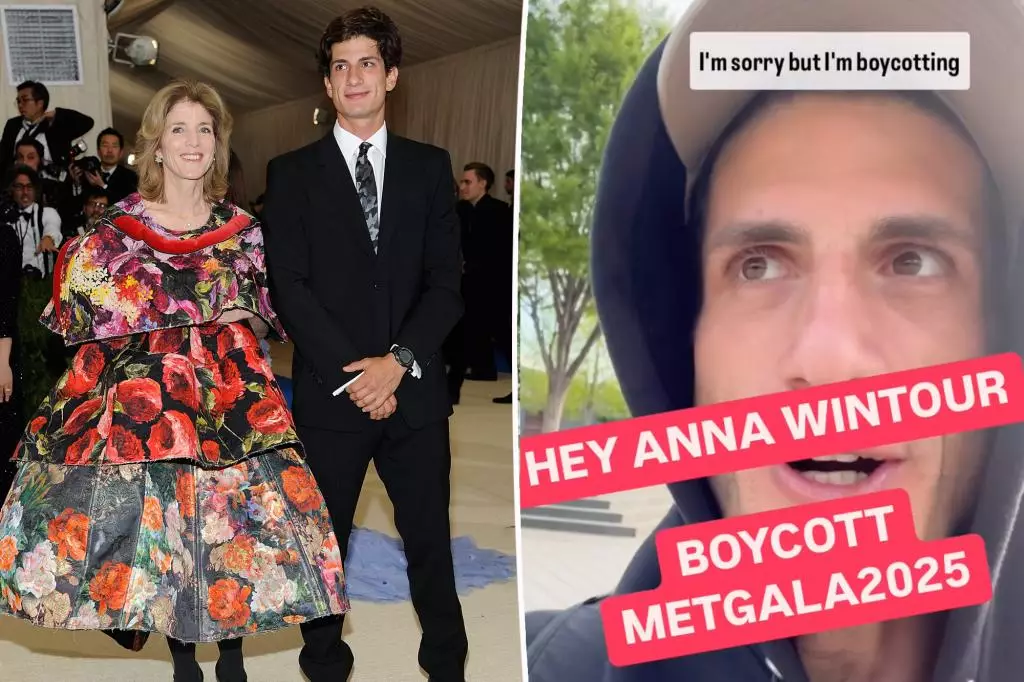The Met Gala, often referred to as the “Oscars of Fashion,” is renowned for its intricate themes and breathtaking red carpet appearances. However, in a surprising twist this year, Jack Schlossberg, a member of the illustrious Kennedy family, has sparked significant attention with his public declaration of a “boycott” against the high-profile event. What’s intriguing is that his comments might be more of a publicity stunt than a legitimate social protest, as sources indicate he wasn’t even invited in the first place. It raises the question: does Schlossberg’s claim hold any merit, or is it simply the wild musings of a privileged individual seeking to find his moment in the social media spotlight?
The Tone of Protest
In a series of bold social media posts, Schlossberg has taken a firm stance against this year’s Met Gala, stating, “With so much happening at home and around the world, it’s not the time for a party like that — at least for me.” His words resonate with some who feel that extravagant events are out of touch with current global challenges. However, given that they come from an individual who has attended the gala in the past as a plus-one, and is now suggesting a boycott that seems void of invitation, it creates an uncomfortable irony. The act of boycotting a party one wasn’t invited to feels less like a moral stand and more like an attempt to draw attention to his own relevance.
The Irony of Fashion and Influence
Schlossberg’s discourse embodies a complicated relationship with fashion and activism. He has taken to Instagram to challenge Vogue, accusing it of apathy in the face of pressing social issues. “Vogue shouldn’t be so scared of my boycott,” he asserts, implying that his words carry a weight that could influence a publication of Vogue’s caliber. However, the question arises: do social media outbursts carry enough substance to incite real change, or are they merely echo chambers for personal grievances? It is also important to note that while Schlossberg pursues this narrative of protest, he simultaneously promotes his own upcoming project, indicating a potential conflict between genuine activism and self-promotion.
Understanding the Met Gala’s Intricacies
For those unfamiliar, the Met Gala operates on a highly exclusive invitation basis, where every seat at the table is generally secured through sponsorship by a designer or luxury brand. Schlossberg’s comments about the event highlight a misconception regarding eligibility, as his past role as a freelancer for Vogue during the election cycle does not automatically qualify him for an invite. This sheds light on the intimidating exclusivity that the Gala embodies, and Schlossberg’s absence speaks volumes about the rigid boundaries present within the fashion industry.
A Shift in the Conversation
This year’s Gala theme, “Superfine: Tailoring Black Style,” aims to spotlight the contributions of Black designers to the fashion world. It’s a significant occasion meant to march towards inclusivity, which is juxtaposed with Schlossberg’s protest. The crux of his argument addresses the political weight of fashion, yet his boycott draws attention away from the very issues the Gala seeks to confront. With prominent figures like Shakira, Lizzo, and LeBron James leading the charge, Schlossberg comes off as an outsider throwing stones rather than an insider pushing for change.
Unpacking the Real Motive
While Schlossberg’s motivations can be seen as a call to action against superficiality in fashion, they also serve a dual purpose: crafting a personal narrative that keeps him relevant in contemporary discussions. His social media tirade illustrates a unique blend of advocacy and self-interest. Yet, one cannot overlook the more significant presence of established icons who are actively using their platforms to highlight crucial societal issues rather than merely vocalizing a boycott based on personal grievances. In this clash of perspectives, Jack Schlossberg must navigate the fine line between being an influencer and an advocate for real change.
Schlossberg’s journey from an overlooked socialite to a self-proclaimed activist might reflect a deeper yearning for significance, but the true question lies in whether our societal platforms will grant him the audience he covets or whether the importance of the message will ultimately drown in personal theatrics.

